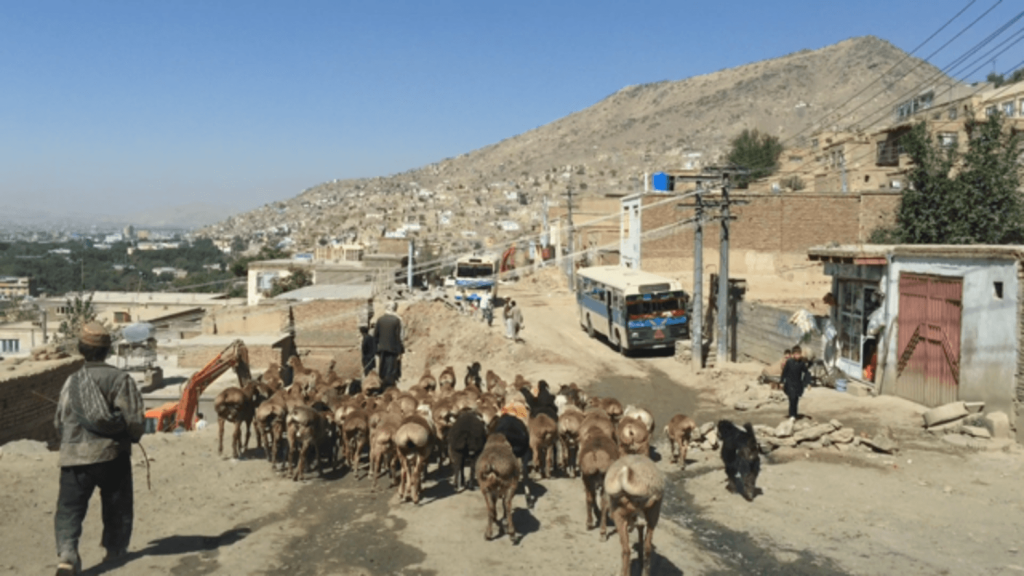
Shops are closed in a market as hundreds of businessmen, shop owners and traders protest against tax hikes in Kabul, Afghanistan, Monday, April, 6, 2015. Rahmat Gul/AP
Kabul's Mood Turns Toward Despair
From shopkeepers to university lecturers, the question of whether security is improving in an increasingly independent Afghanistan was met with just one response: Things are actually worse.
It is fighting season in Afghanistan and August was particularly bloody on Kabul’s streets.
In the weeks before I arrived in the city, attacks had left dozens dead, hundreds more injured and faith in the government’s ability to secure the capital all but shattered.
While a secure Kabul rarely means a stable Afghanistan, an insecure Kabul inevitably signals a deeply unstable nation. Kabul’s violent summer pales compared to the surrounding provinces, especially in the south. As Western nations increasingly focus elsewhere, the battle for Afghanistan rages on.
‘Things are worse’
Afghanistan is delicately balanced between starkly different futures. During my first visit in 2014, the general feeling in the capital was of cautious optimism, even hopefulness. The impressive voter turnout for the national elections reflected a general feeling that a new government meant new possibilities and raised hopes for the future.
Returning to Kabul less than a year later, it seems the trajectory of Afghanistan’s future is shifting towards one of despair rather than hope. President Ashraf Ghani’s public chastisement of Pakistan after a suicide bombing at the entrance of Kabul’s international airport suggests frustrations have reached Afghanistan’s highest public office.
It is visceral on Kabul’s streets. From shopkeepers and taxi drivers to “gym rats” and university lecturers, my question of whether Afghanistan was improving, whether security was better despite August’s bloodshed, was met with the same response: Things are worse.
A combination of factors has contributed to this sentiment. A spike in insurgent violence and the drawdown of Western forces are obvious. A corollary of the drawdown has been that thousands of foreign workers have left Afghanistan, creating an economic vacuum that has left many local businesses scrambling.
Another factor is at play too. For much of its modern history, Afghanistan’s trajectory has been disproportionately shaped by foreign forces: the perpetual meddling of its regional neighbours, British colonisers in the early 20th century, the Soviet Bloc later that century and, most recently, a coalition of Western nations.
For the first time in decades, responsibility for Afghanistan’s future is perceived to rest largely in Afghan hands. The grim outlook expressed to me by locals thus reflected more than post-election frustrations; theirs was a sense of crisis born of the disparity between Afghan hopes for their government and its realities.
Moderating expectations will be crucial to curbing frustrations and sustaining security and stability.
The difficult road ahead
Afghanistan’s challenges are immense. With a population of some 28 million, 76% live rurally and more than 13 million suffer varying degrees of food insecurity.
Efforts to combat this rampant poverty are hindered by a gender inequality index which is among the world’s worst. The devastating impact of three decades of war is captured by almost half the population being under 14 years of age.

Most Afghans are rural-dwelling and poverty stricken (H.Ingram)
Ethno-tribal allegiances continue to shape, to varying degrees, how many Afghans see themselves and each other, especially in rural areas. This is particularly noticeable during discussions about the nation’s security.
Sitting motionless in Kabul traffic, my taxi driver explained:
Where the Pashtun people are, there are problems. In the south, always problems. Now, in the north, where the Pashtun people are, there are problems.
Pausing for a moment as the traffic started its crawl, he added:
I know not all Pashtuns are bad … but most of them are.
Mediating these differences, not glossing over them, represents another complex challenge for the government.
These and many other issues need to be addressed while fighting multiple insurrections. The Taliban’s insurgency, rather than a single, coherent and homogenous force, is heterogeneous and characterised by several networks. These faultlines were recently exposed by the succession of Mullah Mansour as Taliban leader.
A fractured Taliban not only represents a more volatile threat but its breakaway factions could establish independent groups or join Islamic State’s local chapter, Wilayat Khurasan, which is leveraging this unrest to burrow into Afghanistan’s provinces.
Reasons for hope
In isolation, the current picture of Afghanistan seems incredibly bleak.
Yet, within its historical context, the country’s advancements are undeniable. It is easy to forget that a mere two decades ago Afghanistan was transitioning to Taliban rule following two ruthless wars.
There is another reason for hope. Afghanistan’s universities are filled with energetic and highly capable students. While speaking to a class of hopeful postgraduate researchers at Kabul University, their sense of responsibility for shaping their country’s future was palpable.
Education will be a crucial mechanism for bridging gender inequalities, fighting the root causes of societal problems such as poverty and extremism, and producing the next generation of Afghan leaders.
The immense burden for harnessing the potential of Afghanistan’s very young and increasingly globally “connected” population for good and not ill will rest heavily on this generation.
Continuing Western support for current security and stability efforts will be essential to Afghanistan’s survival. But support for education in Afghanistan is an investment in the future. The world’s refugee crisis is merely a symptom of a more profound problem: the world’s tendency to ignore the human tragedies that produce refugees.
Afghanistan is on the brink of its best chance at a brighter and more hopeful future, but darker forces are committed to steering the nation in another direction.
While Afghan hopes persist, surely ours should too.
This article was originally published on The Conversation .

